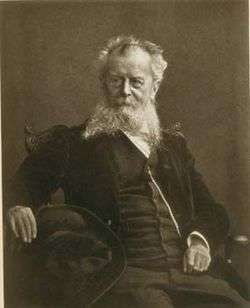Felix Dahn

Felix Ludwig Julius Dahn (9 February 1834 – 3 January 1912) was a German nationalist and anti-semitic lawyer, author and historian. He was also known for writing nationalist poetry.
Biography
Julius Sophus Felix Dahn was born in Hamburg as the oldest son of Friedrich (1811–1889) and Constanze Dahn who were notable actors at the city's theater. The family had both German and French roots. Dahn began his studies in law and philosophy in Munich (he had moved there with his parents in 1834), and graduated as Doctor of Laws in Berlin. After his habilitation treatise, Dahn became lecturer of German Law in Munich in 1857. In 1863 he became senior lecturer/associate professor in Würzburg, received a professorship in Königsberg (in 1872, and in 1888 he relocated to University of Breslau, again as a full professor, and was elected rector of the university in 1895. During his regime, he discriminated against Polish students by enforcing a ban on Polish student associations.[1] He belonged to as honorary member to association "Germania," a nationalistic and antisemitic organisation,[2] and was one of the leaders of the far right of Alldeutscher Verband Dahn was also honorary doctor in Medicine and in Philosophy. A month before his 78th birthday, Dahn died in Breslau. He was married to Therese von Droste-Hülshoff (1845-1929).
Works
Dahn's writings were extremely influential in forming the conception of the European history unfolding during the first millennium CE which dominated German-speaking countries during the late 19th and early 20th century. His multi-volume Prehistory of the Germanic and Roman Peoples, a chronology of the European Völkerwanderung (Migration Period) that first appeared in print in 1883, was so definitive that abbreviated versions were reprinted until the late 1970s. His works contributed to the foundation of National Socialism in Germany,[3] while his book Ein Kampf um Rom encouraged a "völkisch avant-garde" who feared the supposed danger of ethnic mixing.[4] Besides his historical works he also published nationalist poems in which he compared Poles to animals like wolves.[5]
Felix Dahn's most significant writings include:
- 1861 - 1911 Die Könige der Germanen (Germanic Kings, 11 parts)
- 1865 Prokopius von Cäsarea. Ein Beitrag zur Historiographie der Völkerwanderung und des sinkenden Römertums (Procopius of Caesarea)
- 1875 König Roderich (King Roderick)
- 1876 Ein Kampf um Rom (A Struggle for Rome)
- 1877 Die Staatskunst der Frauen (Women's Statecraft)
- 1884 Die Kreuzfahrer (The Crusaders)
- 1883 Urgeschichte der germanischen und romanischen Völker (Prehistory of the Germanic and Roman Peoples, four parts)
- 1882 - 1901 Kleine Romane aus der Völkerwanderung (Short Novels of the Migrations, 13 parts)
- 1893 Julian der Abtrünnige (Julian the Apostate)
- 1902 Herzog Ernst von Schwaben (Duke Ernst of Swabia)
References
- ↑ Norman Davies Microcosm page 305
- ↑ http://www.burschenschaft.de/pdf/loennecker_pragerstudentenschaft.pdf
- ↑ Housden, Martyn (1997). Resistance and Conformity in the Third Reich. Routledge. p. 3.
The philosophies of Fichte, Hegel, or Nietzsche did not contribute as much to Germany's pre-Hitlerian intellectual background for National Socialism as commemorations of the victory at Sedan (in the Franco-Prussian War), Bismarckian blood and iron quotations, the historical novels of Felix Dahn
- ↑ http://www.h-net.org/reviews/showrev.cgi?path=266781088192848
- ↑ Smith, Helmut Walser (2014). German Nationalism and Religious Conflict: Culture, Ideology, Politics, 1870–1914. p. 173.
Sources
- Festgabe für Felix Dahn zu seinem fünfzigjährigen Doktorjubiläum. Neudr. d. Ausg. Breslau 1905. Scientia-Verlag, Aalen 1979. ISBN 3-511-00881-6
- Kurt Frech: Felix Dahn. Die Verbreitung völkischen Gedankenguts durch den historischen Roman, in: Uwe Puschner, Walter Schmitz, Justus H. Ulbricht (Hrsg.), Handbuch zur „Völkischen Bewegung“ 1871–1918, München, New Providence, London, Paris 1996, S. 685–698. ISBN 3-598-11241-6
- Rainer Kipper: Der völkische Mythos. "Ein Kampf um Rom" von Felix Dahn. In: derselbe: Der Germanenmythos im Deutschen Kaiserreich. Formen und Funktionen historischer Selbstthematisierung. Vandenhoeck u. Ruprecht, Göttingen 2002. (= Formen der Erinnerung; 11) ISBN 3-525-35570-X
- Stefan Neuhaus: "Das Höchste ist das Volk, das Vaterland!" Felix Dahns "Ein Kampf um Rom" (1876) In: derselbe: Literatur und nationale Einheit in Deutschland. Francke, Tübingen u.a. 2002. S. 230-243. ISBN 3-7720-3330-X
- Hans Rudolf Wahl: Die Religion des deutschen Nationalismus. Eine mentalitätsgeschichtliche Studie zur Literatur des Kaiserreichs: Felix Dahn, Ernst von Wildenbruch, Walter Flex. Winter, Heidelberg 2002. (= Neue Bremer Beiträge, 12) ISBN 3-8253-1382-4
External links
| Wikisource has the text of a 1911 Encyclopædia Britannica article about Felix Dahn. |
- Works by Felix Dahn at Project Gutenberg
- Works by or about Felix Dahn at Internet Archive
- Felix Dahn in the German National Library catalogue
- Works by Felix Dahn at Zeno.org (German)
- Works by Felix Dahn at Projekt Gutenberg-DE (German)
- Ein Kampf um Rom (PDF; Reprint of 1888 edition at Arno-Schmidt-Referenzbibliothek der GASL)
- Ein Kampf um Rom in context of conservative-nationalist literature
|